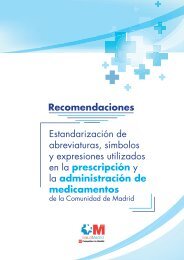lKd7nD
lKd7nD
lKd7nD
Create successful ePaper yourself
Turn your PDF publications into a flip-book with our unique Google optimized e-Paper software.
Choosing a Twin<br />
Gregory Pardlo<br />
The legendary minstrel<br />
performer, Bert Williams, was<br />
born in Nassau, Bahamas,<br />
in 1874. It may seem odd<br />
to begin my comments on<br />
translation with a reference to<br />
Bert Williams (or minstrelsy in<br />
general), but there is an analogy<br />
here that I think is instructive. Despite being racially black,<br />
Williams not only applied burnt cork to his face, but also had to<br />
bridge cultural differences to produce a compelling (however<br />
insulting) stage version of the “American Negro.” The character<br />
he produced was mostly a product of popular imagination.<br />
In other words, Williams was successful at taking “genuine”<br />
black expression and translating it into a version that popular<br />
audiences wanted to believe was real. He was celebrated not so<br />
much because his imitation of African-American speech—which<br />
was initially foreign to him—was convincingly “accurate” to<br />
his fans, but because he made their illusions come alive. He<br />
enlivened the one-dimensional stock character with his own<br />
creative force. I may be reaching with this analogy in some ways,<br />
but minstrelsy magnifies for us one kind of dramatic illusion<br />
that I think literary translation relies upon. When I translate<br />
poetry, I have to make the poet whose work I am translating<br />
into a character I hope to embody, a character that may not<br />
actually exist in English or to English-only readers. And I have to<br />
present that character in a way my reader will find full of human<br />
complexity without making the character just another version of<br />
myself. Yet, if I focus on the language alone—that is, if I focus on<br />
translating each word “correctly” as if the poem were a language<br />
exam—I risk producing a one-dimensional stereotype of the<br />
poet’s native culture. All this is to say “accuracy,” particularly<br />
when translating poetry, is not necessarily a desirable outcome.<br />
When I have difficulty getting my writing day started, I google<br />
poems written in a language I can no sooner translate than<br />
tea leaves. I pull a translating dictionary from my shelf in that<br />
language if I have one (I’m an avid collector), and attempt<br />
*<br />
The Art of Empathy: Celebrating Literature in Translation<br />
5



